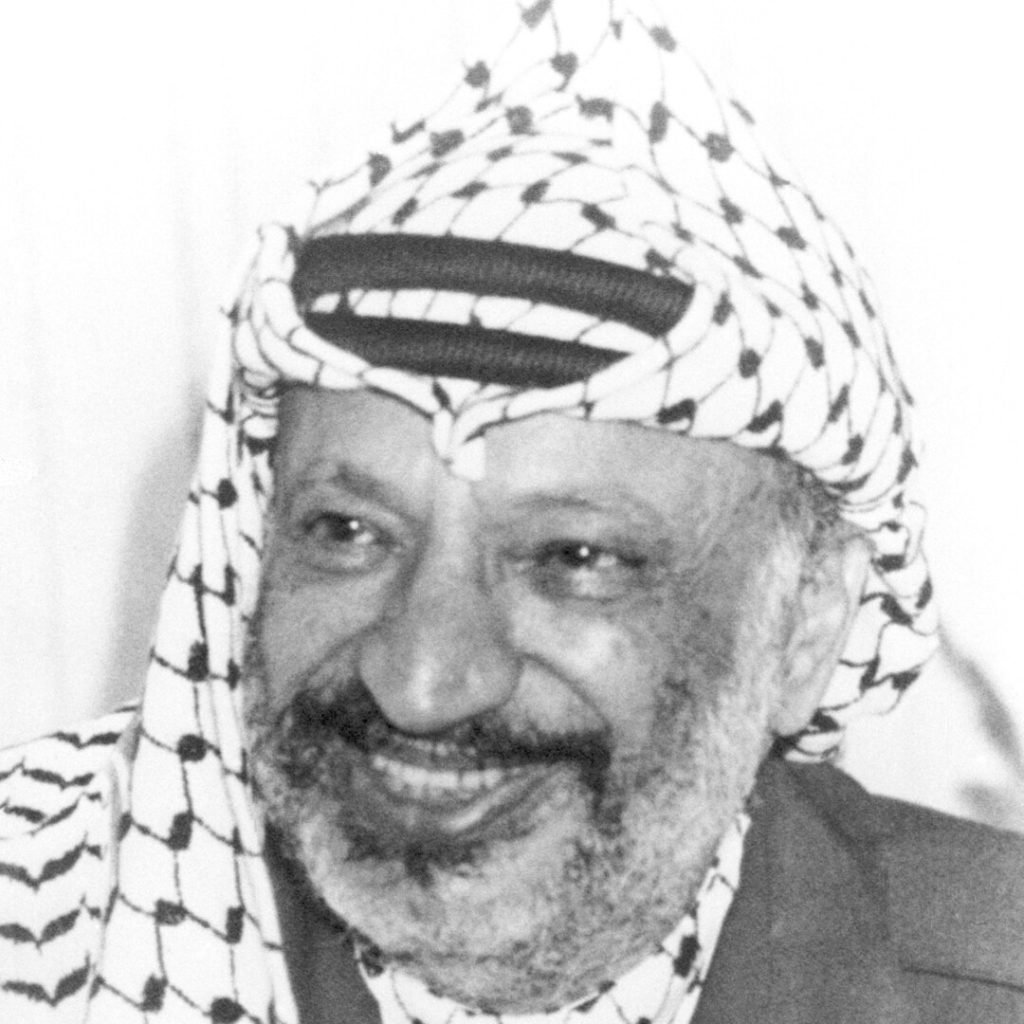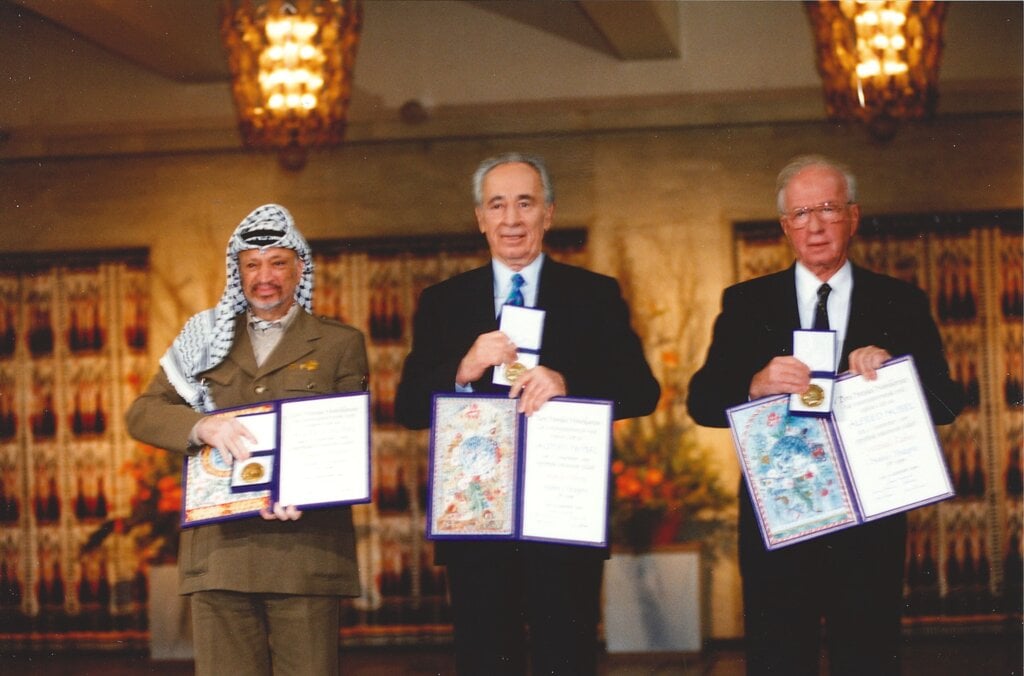Yasser Arafat
Speed read
Yasser Arafat was awarded the Nobel Peace Prize, jointly with Shimon Peres and Yitzhak Rabin, for his efforts to create peace in the Middle East.

Full name: Yasser Arafat
Born: 24 August 1929, Cairo, Egypt
Died: 11 November 2004, Paris, France
Date awarded: 14 October 1994
For negotiations with Israel
The young Arafat experienced the Arabs’ crushing defeat in the 1948-49 war against the newly established state of Israel. This defeat and the following one in the 1967 Six-Day War resulted in a loss of territory. Hundreds of thousands of Palestinians were forced to flee their homes. In 1969, Arafat became the leader of the Palestinian Liberation Organisation (PLO) whose aim was to destroy Israel, drive out the Jews and enable Palestinian refugees to return home. But the Palestinians did not have sufficient military might to conquer the Israelis. In the 1980s, Arafat indicated that he was willing to recognise the state of Israel on the condition that Israel withdrew from the occupied West Bank and Gaza. In 1993, after secret negotiations in Oslo, the Israelis signed an agreement trading land for peace.
"Peace is in our interest: as only in an atmosphere of just peace shall the Palestinian people achieve their legitimate ambition for independence and sovereignty."
Yasser Arafat, Nobel Prize lecture, 10 December 1994.
| Oslo Accord Peace treaty between Israel and the Palestinian Liberation Organisation (PLO) negotiated in Oslo in 1993. Most importantly, the parties officially recognised one another and agreed that negotiations should replace the use of weapons. |
Arafat and the Oslo Accord
In 1987, Palestinians on the West Bank and in Gaza spontaneously rose up against the Israeli occupation, launching an intifada. Israel and the USA began negotiations with Palestinians who were not affiliated with the PLO. Arafat faced the risk of being relegated to the sidelines. But he took the offensive, sanctioning secret negotiations between PLO members and peace-minded Israelis mediated by Norwegian contacts. The negotiations were approved by the Israeli Government in 1993. Arafat signed the Oslo Accord on behalf of the Palestinians and was acknowledged as their leader by both Israel and the USA.
Was Arafat a terrorist?
Around 1970, Palestinians began to engage in terrorist activities to draw the world’s attention to the Israeli occupation. During the 1972 Olympic Summer Games in Munich, 11 Israeli athletes were killed in a terrorist operation organised by the group Black September. Was Arafat behind it? While he did not give direct orders to carry out such attacks, he did approve of them as long as they could not be traced back to the PLO. Nevertheless, several historians claim that Arafat saw early on that terrorism did not serve the Palestinian cause. In 1988, he held a speech denouncing its use in the campaign to establish an independent Palestine.
| Black September In September 1970, the PLO was expelled from Jordan. Afterward, a PLO splinter group took the name “Black September” and committed terrorist acts in the fight for the Palestinian cause. The most well-known of these was conducted against Israeli athletes during the Olympic Games in Munich in 1972. |
"All three of our laureates are men in crucial positions ... At the same time, their positions are vulnerable. Nonetheless, they have used their positions together to seek to change the course of development, to break out of the evil circle of hatred and violence, and to chart out a path towards reconciliation."
Francis Sejersted, Presentation speech, 10 December 1994.
Dissent within the Committee
One of the members of the Norwegian Nobel Committee resigned in protest when Arafat was awarded the 1994 peace prize together with Yitzhak Rabin and Shimon Peres. Convinced that Arafat was a terrorist, Kåre Kristiansen believed that honouring him would damage the reputation of the Nobel Peace Prize. Kristiansen attracted international attention when he stated in a press conference that Israel was waging a war of defence, while Arafat was the father of international terrorism. Several right-wing members of the Storting did not attend the award ceremony in protest against Arafat.

Arafat’s final years
In 1996, Arafat was elected president of the Palestinians. But his ruling council was soon accused of corruption and lack of democracy. Meanwhile, new Israeli leaders sought to offset the establishment of a Palestinian state. In 2001, Arafat’s long-time enemy Ariel Sharon became Israeli prime minister. Israeli forces re-occupied large areas of Palestinian territory, bombing Arafat’s headquarters in Ramallah and isolating him there. In autumn 2004, the critically ill Arafat was flown to a hospital in France. The symbol of the struggle for Palestinian independence died there, without seeing his dream of a free Palestinian state come to fruition.
"... Arafat has always been an optimist; although that quality is being tested as never before."
Tony Walker and Andrew Gowers: 'Arafat. The Biography.' Page 440, Virgin Books 2003.
Learn more
Mohammed Abdel-Raouf Arafat As Qudwa al-Hussaeini was born on 24 August 1929 in Cairo, his father a textile merchant who was a Palestinian with some Egyptian ancestry, his mother from an old Palestinian family in Jerusalem ...
Disclaimer: Every effort has been made by the publisher to credit organisations and individuals with regard to the supply of photographs. Please notify the publishers regarding corrections.
Nobel Prizes and laureates
Six prizes were awarded for achievements that have conferred the greatest benefit to humankind. The 12 laureates' work and discoveries range from proteins' structures and machine learning to fighting for a world free of nuclear weapons.
See them all presented here.
